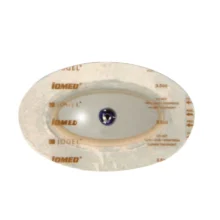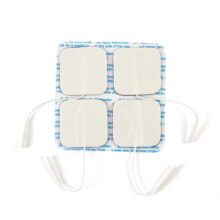Optima Iontophoresis Electrodes: Applications
- Pain Management: Optima Iontophoresis electrodes can be used to administer localized pain relief by delivering analgesic medications, such as lidocaine or corticosteroids, to the affected area. This is often employed in conditions like musculoskeletal pain, arthritis, or sports injuries.
- Inflammation Reduction: Iontophoresis can help reduce inflammation in specific body parts by delivering anti-inflammatory medications, like dexamethasone or salicylates, directly to the site of inflammation. This is commonly used in conditions such as tendonitis, bursitis, or other inflammatory disorders.
- Scar Reduction: Iontophoresis electrodes can be used to deliver medications that promote wound healing and scar reduction. This is particularly useful in post-surgical scar management.
- Hyperhidrosis (Excessive Sweating): Iontophoresis is an established treatment for hyperhidrosis, a condition characterized by excessive sweating, often in the hands, feet, or underarms. It helps reduce sweating by delivering tap water ions into the sweat glands to block their activity.
- Dermatological Conditions: Optima iontophoresis electrodes can be employed in dermatology to deliver medications for the treatment of various skin conditions, such as psoriasis, eczema, or localized fungal infections.
- Localized Infections: In some cases, iontophoresis may be used to deliver antibiotics or antimicrobial agents to the site of localized infections, aiding in the treatment process.
The process of iontophoresis involves placing the medication-containing electrode (usually the anode) on the skin over the affected area and using a separate electrode (usually the cathode) at another location on the body.
A low-level electrical current is applied, which facilitates the movement of ions from the medication electrode through the skin and into the body tissues. This allows for controlled and targeted drug delivery without the need for injections or oral medications.
Iontophoresis is considered a safe and well-tolerated treatment when administered by trained healthcare professionals. The choice of medication, electrode placement, and treatment parameters are determined based on the patient’s condition and treatment goals. It is important to consult with a healthcare provider to determine if iontophoresis is an appropriate treatment option for a specific medical condition.






Commentaires
Il n'y a pas encore de commentaires